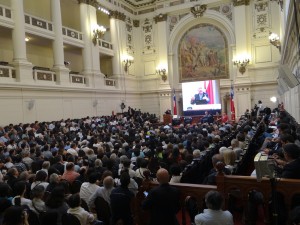 What we experience today as the democratic system is essentially the result of constant technological progress. As you know, in the Western world the appearance of the Gutenberg Press in the 15th Century transformed politics and society. This revolution led, a century later, to the printing of the first newspaper and the consequent formation of an educated critical minority who felt just as or more capable than the king to take part in public deliberations. The radical response to these new opinions was the French Revolution and with that, decades later, came suffrage and democratic representation.
What we experience today as the democratic system is essentially the result of constant technological progress. As you know, in the Western world the appearance of the Gutenberg Press in the 15th Century transformed politics and society. This revolution led, a century later, to the printing of the first newspaper and the consequent formation of an educated critical minority who felt just as or more capable than the king to take part in public deliberations. The radical response to these new opinions was the French Revolution and with that, decades later, came suffrage and democratic representation.
In the 20th century, radio, cinema and television appeared which changed the form rather than the substance. The dynamics of classical democracy were maintained: the leader issued an opinion and it was reported through the media. The citizen then read the newspaper, listened to the radio or watched television and decided whether or not to contribute politically.
This long journey has been definitively transformed by the appearance of the virtual ‘click’. The Internet and new information technologies allow us to be connected simultaneously, to the extent that very often one interacts more with people virtually than in person. Local, regional and national governments are no longer mediated by political parties and Congress could start to be run directly by social networks. So, for example, calls to repair a traffic light, for a law to be approved or to report a traffic infraction can be multiplied in a minute by a tweet, a photograph on Instagram or a Facebook entry. Everyone wants to make their opinion felt, or just to be heard.
The question, then, is what is going to happen to institutions as we know them today? How will political parties be organized? What will the parliaments of the future be like? The citizen’s power of information is omnipresent, as is their voice. Will we hold votes via our smartphones? ‘Mark 1 if you approve, 2 if you disapprove or 3 if you’re not interested.’ The possibility is there, the risk lies in acting on it and to do that we must establish conditions. In Uruguay, for example, for a law to be revoked a large number of citizens must request it and a greater number must participate in the vote for it to be binding. In this case, the use of technology would help to democratize the population.
So, to build a democracy of mass participation, civilized institutions must be designed so that, using these new technologies, they can incorporate emerging demands and generate spaces similar to public forums in which every citizen’s voice can be heard in the debate.
We have returned to the Greece of Pericles, the only difference being that we are no longer 200 but millions and the power and responsibility for conceiving issues and solutions can begin with a click.
Leave a comment



